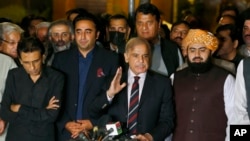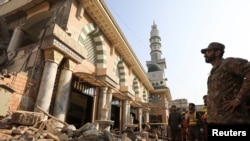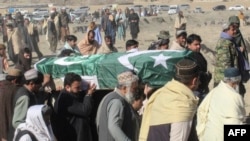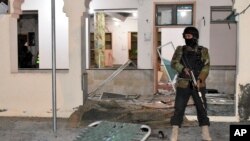In the wake of the deadly bombing of a mosque in northwestern Pakistan on January 30, Prime Minister Shahbaz Sharif has called a conference of all political parties on February 7 to seek agreement on how to tackle terrorism.
As Pakistan mulls its response to the rising threat from Tehreek-i-Taliban Pakistan, parliamentarians, including ministers, this week demanded that the military provide information about terrorism and leave the decision-making to elected representatives.
The massive bomb blast in a Peshawar mosque made January the deadliest month in Pakistan since July 2018, according to the Islamabad-based Pakistan Institute for Conflict and Security Studies. Across the country, 134 people died and more than 250 were injured in at least 44 militant attacks during the month.
The bombing, which targeted police, climaxed a wave of near daily attacks since peace talks with Tehreek-e-Taliban Pakistan failed last year and the militant group announced war against Pakistani security institutions.
Although the group, also known as the TTP, distanced itself from the Peshawar bombing after one of its factions took responsibility, it was behind most of last year’s deadly attacks.
This week, TTP fighters attacked a police station in Punjab province, showing their growing reach. The group is also building alliances with militants in the restive southwestern Baluchistan province.
Zahid Hussain, an Islamabad security affairs expert, called negotiating with the globally recognized terror group “a huge mistake” because it gave TTP a chance to reorganize.
“They have regrouped, and they are better armed because they are equipped now by probably more modern weaponry from Afghanistan, because lots of weapons have been left by the NATO forces and that has been used by the TTP,” said Hussain.
In a recent meeting of the cabinet, Sharif blasted his predecessor Imran Khan’s government for negotiating with the TTP.
In a nationally televised address, Khan defended that policy, saying that 30,000 to 40,000 TTP fighters wanted to come back to Pakistan after the U.S.-led war in Afghanistan ended.
Referring to resettling TTP fighters in Khyber Pakhtunkhwa province, which borders Afghanistan, Khan said his government had the option to “either kill all of them or reach an agreement with them and allow them to settle in the province.”
Parliamentarians say military officials briefed them about the possibility of talks with the TTP, but that negotiations were held without formal endorsement from elected representatives.
Pakistani Taliban and Afghanistan
TTP top leadership and thousands of fighters are allegedly present in Afghanistan. They fled there after the Pakistani military conducted operations in the former tribal areas bordering Afghanistan.
The TTP is an ideological offshoot of the Afghan Taliban. The terror group supported the Afghan Taliban in fighting the U.S.-led coalition.
Referring to Pakistan’s policy of fighting the Pakistani Taliban but supporting the Afghan Taliban, Pakistani parliamentarian Mohsin Dawar said, “There was a general narrative, which was coined by the state, that there is a good Taliban, there is a bad Taliban.”
"We've been saying for a very long time that TTP, this Imarat-e-Islami [Afghan Taliban] and the Haqqanis [Haqqani network], XYZ, all these are the same thing. You know, there is no difference between them,” said Dawar, who represents parts of the former tribal areas in the National Assembly of Pakistan’s bicameral parliament.
He said the victory of the Afghan Taliban had emboldened the Pakistani arm.
Speaking to the National Assembly after the Peshawar bombing, Defense Minister Khawaja Asif did not comment on the contradictory policies toward the Pakistani and Afghan Taliban but expressed regret over the state’s involvement in wars inside Afghanistan.
“We ourselves sowed the seeds of terrorism when the Russian troops entered Afghanistan and we provided our services to the U.S. on rent,” said Asif.
Pakistan contends the TTP is using Afghan territory to plan attacks and accuses Afghanistan of taking insufficient action against the terror group, a charge the Taliban rulers reject.
Military’s role
Residents of former tribal areas and other cities in Khyber Pakhtunkhwa province have been protesting for months, demanding government action as incidents of targeted killing, extortion and bombings rise.
Hussain said that while the military can be used to reclaim fallen territory, “terrorism is fought by the civilian forces in the long term” and government should strengthen police and counterterrorism departments to target breeding grounds of extremists, as the police “are in [a] much better position to know actually where those elements are.”
Civilian law enforcement in Pakistan is perpetually underfunded, routinely faces political interference and is often accused of corrupt practices.
In the lead-up to the all-parties conference on February 7, Sharif chaired a high-level meeting Friday to consider steps to upgrade the counterterrorism departments and police force.
Speaking to the National Assembly after the Peshawar attack, Interior Minister Rana Sanaullah said the military should place the facts before the house. He said the prime minister and the army chief would come to brief the lawmakers on the way forward.
Dawar is not hopeful lawmakers will be able to call the shots. He said parliament is “dysfunctional,” largely because of political wrangling between the ruling coalition and Khan’s party.
Senior members of Khan’s party have indicated he may not join the all-parties conference.
As the current and former prime ministers and their parties accuse each other of mishandling the threat of TTP, Dawar said none should be exempt from criticism, “because if you surrender your power and you leave your policymaking to the military leadership, it's your fault.”







